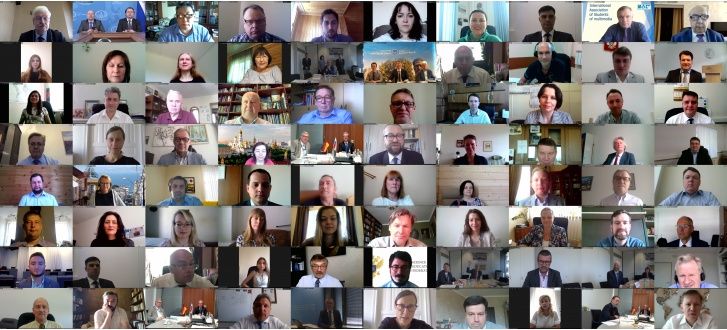At the meeting of Russian-German joint commission on scientific and technical cooperation
News, 27 June 2020
On 25 June 2020, a JINR delegation took part in a regular meeting of the Mixed Russian-German commission on scientific and technical cooperation (MCSTC). The bilateral meeting of experts from Russia and Germany was held as a video conference chaired by Deputy Minister of Science and Higher Education of the Russian Federation Sergey Lulin and State Secretary at the Federal Ministry of Education and Research of Germany Wolf-Dieter Lukas.
On behalf of the Joint Institute, the meeting was attended by JINR First Vice-Director Grigory Trubnikov who presented the report on the strategy and vision of Germany-JINR cooperation, JINR Vice-Director Vladimir Kekelidze who made the report on the partnership with Germany in the frames of the NICA project, JINR Vice-Director Boris Sharkov, Head of the JINR International Cooperation Department Dmitry Kamanin and JINR Directorate Advisor Uwe Meyer.
In their reports, Grigory Trubnikov and Vladimir Kekelidze confirmed the JINR intention to further develop the JINR priority cooperation with the Federal Ministry of Education and Research (BMBF). In particular, Grigory Trubnikov noted the importance of the Joint Declaration of Intent signed on 12 November 2019 that continued the quarter-century history of BMBF-JINR agreements. Signing the agreement between JINR and the GSI Helmholtz Centre for Heavy Ion Research in February 2020 on the participation of German partners in the implementation of the NICA project was noted as one of the most significant results of the implementation of the Roadmap. It was highlighted that complementary opportunities of the BMBF-JINR and GSI-JINR agreements served as an effective platform for establishing a completely new level of cooperation.
Grigory Trubnikov said in his presentation that one of the relevant issues for JINR and BMBF of the bilateral agenda is the discussion of prospects for enhancing the status of the current bilateral JINR-BMBF agreement up to the Agreement on Associate Membership of Germany in JINR. At the same time, Grigory Trubnikov proposed to consider a further upgrade of German status to the full JINR Member State status. This would allow Germany to use the highest potential of cooperation to the full extent. In the nearest future, providing Germany with the status of an Associate Member of the NICA Supervisory Council would facilitate strengthening and harmonization of contacts between FAIR and NICA projects.
Support of young scientists and talents is one of the key issues in the Russian-German Roadmap, so the proposal by Grigory Trubnikov to launch the annual FAIR-JINR school in 2021 agreed on a day before by representatives of JINR, FAIR and BMBF at the special round table is of high relevance in this regard. Furthermore, Grigory Trubnikov proposed to consider an opportunity to organize the NICA-FAIR Research Centre to support Russian and German young researchers involved in NICA and FAIR projects. It was also proposed to implement a Germany-Russia pilot doctorate programme.
Further discussion of these proposals in the frames of BMBF-JINR cooperation, as well as working out new principles of forming bilateral thematic plan are awaited at the meeting of the Coordination Committee for BMBF-JINR cooperation that will take place on 1 July 2020.
More details about the MCSTC meeting are available on the Minobrnauki website.
The MCSTC key aim is to discuss the implementation of the Roadmap for Russia-Germany cooperation in the fields of education, science, research and innovations that was signed on 10 December 2018 in Moscow. It regulates scientific and technological cooperation of the two countries up to 2028. As participants of the meeting noted, the implementation of the agreement is important for the development of Russian-Germany relations in general.
The Roadmap includes, in particular, joint scientific research at large-scale research infrastructures of Russia and Germany. The Complex of Superconducting Rings for Heavy Ion Colliding Beams NICA is one of the complementary mega-science projects included in the Russian-German Roadmap along with the German project “FAIR” that is also being implemented in the international format.
